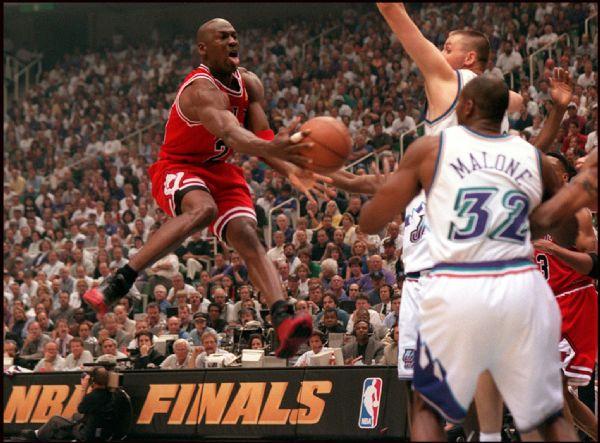This is an archived article that was published on sltrib.com in 2009, and information in the article may be outdated. It is provided only for personal research purposes and may not be reprinted.
It was the most glorious time in Jazz history.
For two years after John Stockton, Karl Malone and the rest of the Jazz had climbed to within sight of the NBA Finals, they pursued their dream of finally winning a championship with a relentless and renewed passion, burning desire, and the collective hope of a city and state rising and falling on every big basket and bad pass.
And there were plenty of each to go around.
The two years in which the Jazz ultimately landed -- and lost -- in the NBA Finals were nothing less than an ongoing basketball anxiety attack, complete with unexpected injuries, locker-room conflagrations, melodramatic outbursts and dramatic, ache-in-your-stomach finishes on the court.
In the end, the Jazz came away without a championship, but with a great deal of respect around the country.
"It's too bad either team had to lose," President Bill Clinton told coach Jerry Sloan over the phone after the Jazz lost the first of two NBA Finals to the Chicago Bulls in 1997.
The Jazz finally enjoyed their breakthrough to that illustrious level when Stockton buried his famous last-second three-pointer to beat the Houston Rockets on the road in Game 6 of their fourth trip to the NBA's Western Conference Finals -- easily the finest moment in franchise history.
"John Stockton is one of the five best players I've ever played against," Houston's Charles Barkley said. "He's as tough as nails."
Alas, though the Jazz kept the games with the Bulls agonizingly close, they lost the NBA Finals in six games amid some poor performances, most notably by Malone, setting the stage for a 1997-98 season filled with expectations that the aging Jazz would return -- and perhaps finally vanquish the legendary Michael Jordan and the Bulls before their window of opportunity closed for good.
And that's when things turned really interesting.
The next season hadn't even started before Malone -- the reigning NBA Most Valuable Player -- took aim at his own teammates for returning to training camp out of shape, and center Greg Ostertag earned additional scorn for being slapped to the floor by Shaquille O'Neal before the season-opener against the Los Angeles Lakers.
The tumult hardly subsided as the Jazz pursued the valuable home-court advantage in the playoffs; every day, it was something.
Stockton missed the first two months of the season with a knee injury, forward Antoine Carr wondered aloud about retirement, and the Jazz bizarrely had to re-acclimate center Greg Foster and forward Chris Morris after an attempt to trade them fell through. Sloan's wife also battled breast cancer.
The Jazz ultimately finished tied with the Bulls for the best regular-season record in the league -- they were 62-20 that season, after going 64-18 the previous year -- earning home-court advantage against them in the NBA Finals after beating the Rockets, San Antonio Spurs and Lakers (in a stunning sweep) to get there once again.
"The awe is off," Carr declared. "Now we know to go out there and play."
Play they did, but Jordan was there, too.
The Jazz lost home-court advantage almost right away, then suffered a colossal wipeout in Game 3 of the best-of-seven series and never really recovered. They led in the final minute of Game 6 at home, hoping to force a deciding Game 7, but in the most haunting sequence the Jazz have ever seen, Jordan stole the ball from Malone and hit a game-winning jump shot at the other end.
"We got halfway up the mountain and didn't win it," Malone said.
Later, guard Jeff Hornacek announced hopefully that, "I don't see why we can't be in this position next year."
But the Jazz soon would learn why they would not.
mcl@sltrib.com" Target="_BLANK">mcl@sltrib.com



